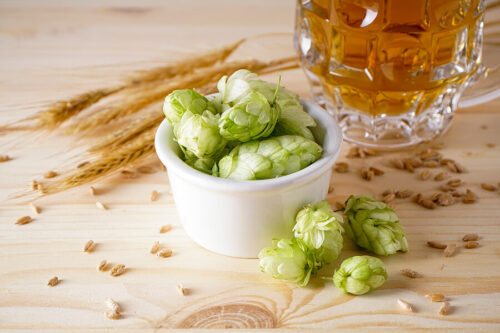Although water is the primary element in beer, there are numerous more constituents. This often includes malt barley, brewer’s yeast, hops, and other flavorings.
Actual beer allergies are uncommon. Because beer contains so many ingredients, an allergy to one of them is more likely. You might probably have a food sensitivity instead of an allergy. Another possibility is alcohol intolerance. Some people cannot consume beer due to a hop allergy, as hops are used in making this popular drink. Let’s see the symptoms and possible prevention of this hops allergy.
What Are the Signs and Symptoms of Beer Allergy?
If you are allergic to beer, your symptoms will most likely be similar to those of other allergic responses. This includes the following:
- Flushing
- Hives
- Sneezing
- Wheezing
- Hoarseness
- Nausea
- Vomiting
- Diarrhea
- Bloating and abdominal pain
- Chest constriction
A food allergy usually manifests itself within a few hours. A food allergy is the body’s immune system’s reaction to a dietary protein that it perceives as dangerous. Allergic responses such as hives, coughing, and chest pain can happen very instantly. They should be regarded as severe and potentially fatal. You should immediately seek medical assistance if you experience any of these symptoms.
If your symptoms are moderate, you may be suffering from a food sensitivity rather than a real allergy. This is also referred to as dietary intolerance. It is unpleasant, but it is not an immune system response and is not as dangerous.
Why Do I Have a Beer Allergy?
Although water is the primary ingredient in beer, there are numerous other substances that may cause your symptoms. If you develop an allergic reaction, you are most likely allergic to a specific component in beer. Depending on the brand, the following components may be present:
- Malted barley or other cereals like wheat or sorghum
- Hops
- Yeast
- Various colorings, flavors, and preservatives
Approximately 2 to 3% of adults in the United States have a food allergy. Food allergies affect about 5% of children, but many of them outgrow them by the time they reach adulthood.
Sensitivity to sorghum or sorghum malt was revealed to be the most common cause of beer allergy in a small 2014 investigation of Chinese adults.
Wheat allergies affect nearly 1.2% of adults in the United States. It’s one of the top eight allergens in food. People who are sensitive to wheat are frequently allergic to barley, though this is not always the case. Barley is generally seen to be harmless for people who are allergic to wheat.
If you’re allergic to a specific grain, beer isn’t the only issue. You’ll also get symptoms if you consume other foods containing that allergy.
What Does It Mean to Be an Alcohol Intolerant?
If you feel bad after consuming alcohol but don’t have symptoms at other times, you may have alcohol intolerance.
Alcohol intolerance is a hereditary disorder, not an allergy to the chemicals in beer. It means your body is unable to break down alcohol adequately.
When you use alcohol, symptoms can appear quickly. They may include the following:
- Runny or stuffy nose
- Flushing of the skin
- Hives
- Nausea
- Vomiting
- Diarrhea
- Low blood pressure
- Asthma symptoms worsening
The only way to overcome alcohol intolerance is to abstain altogether from drinking.
It is not alcohol intolerance if you have symptoms after drinking beer but not after drinking wine or other alcoholic drinks. More than likely, you’re allergic to or sensitive to one of the ingredients in that beer. So, let’s take a look at Hops allergy.
Related: TEA FOR HEADACHES: 10 Best Options
What Are Hops?
Hops resemble little pine cones. Before being used in beer brewing, the flowers are dried. Hop’s pollen produces allergy reactions in certain persons.
They are sometimes referred to as bitters because they combine with grain sugar to give beer its balanced, distinctive flavor. Hops are introduced near the conclusion of the brewing process.
People who are allergic to hops may mistakenly feel they are allergic to beer. In actuality, some people are allergic to the pollen from hops.
What Are the Symptoms of Hops Allergy?
A hop allergy is normally moderate, although it can cause significant discomfort. A skin rash or a sinus condition with swelling, irritation, and pain are some of the hops allergy symptoms. After drinking beer, it might also cause a runny nose, sneezing, or congestion.
People who work in the beer industry may develop a hops allergy. They may experience respiratory difficulties while on the job. When they come into contact with hops, they may acquire a rash on their hands or arms. Someone with a strong hops allergy would be unable to continue working with this plant on a daily basis.
Hives, facial edema, and swelling of the mouth and tongue are other hops allergy symptoms. These are symptoms of anaphylaxis, a potentially fatal whole-body reaction that involves difficulty breathing and swelling in the throat. If you or someone you’re with is experiencing these symptoms, you should seek emergency medical attention.
Can You Have Hops Allergy?
Hop pollen causes a Hop’s allergy, which can impact beer drinkers. According to some, certain beer brands that employ a lot of hops are more prone to induce allergic reactions. If this happens, you can take non-drowsy Benadryl or another antihistamine to relieve some of the symptoms of allergic response.
How Can You Avoid Having Hops Allergy?
The only method to avoid an allergic reaction to hops is to avoid eating foods that contain hops. If you suffer sinus difficulties or other allergic symptoms after drinking beer, you are most likely allergic to the hops in it, not the beer itself.
Risk Factors
You are more likely to develop allergies if you have a family history of allergies. An allergy is more likely to develop if you have a personal or family history of asthma.
A real food allergy is a major medical problem. It implies that you must exercise extreme caution while reading labels and selecting foods and beverages.
A food or drink allergy can cause anaphylaxis in the most severe situations. Hives, wheezing, and chest pain are some of the symptoms. You should seek immediate medical attention if you have any of these symptoms. Anaphylaxis is a potentially fatal disorder.
When Should You See a Doctor?
If you experience allergy symptoms after drinking beer, you should consult your doctor. They can tell you whether you’re allergic to any of the beer’s ingredients. This will assist you in avoiding the chemicals in other items.
Allergy testing of the skin and blood should be able to determine or rule out your allergies.
Your symptoms could possibly be the result of a beer or alcohol interaction with any prescription you’re taking. Inform your doctor if you are using any drugs or supplements.
If you’ve ever had swelling of the tongue or throat or difficulty breathing after drinking beer, you should avoid it until you consult a doctor.
What You Can Do Right Now
There are a few things you can do if you have negative symptoms after drinking beer:
Whether your symptoms are moderate, consider switching to a different brand to see if you can drink it normally.
Mild symptoms may also benefit from an over-the-counter antihistamine. If your symptoms are severe, your doctor may prescribe a stronger antihistamine.
Test yourself for allergies. You can begin the process with your primary care physician or an allergist. Inquire about being tested for substances often found in beer, such as wheat, barley, and sorghum. Note whether you experience the same symptoms after eating or drinking other foods.
If you discover that you are allergic to one of the ingredients in beer, you may still be able to consume it. You might be able to find a beer that doesn’t contain that allergen with a little investigation and careful label reading. You should also avoid any other products containing that component.
If you’ve ever had anaphylaxis after drinking beer, it’s critical to figure out exactly what chemical caused it so you can avoid it in the future. Consult your doctor about carrying a prescription epinephrine pen. These auto-injectors have the potential to save your life. In extreme situations, you may be forced to abstain from beer totally.
Related: Mixed Anxiety Depressive Disorder: Common Symptoms, Causes, and Treatments
How Do You Know If You’re Allergic to Hops?
Allergic responses such as hives, coughing, and chest pain can happen very instantly. They should be regarded as severe and potentially fatal. You should immediately seek medical assistance if you experience any of these symptoms.
Are Hops Anti-inflammatory?
Hops is a plant that has sedative and hypnotic qualities, as well as antidepressant, anti-inflammatory, antioxidant, and chemopreventive characteristics. Hops, because of their major actions on the neurological system and their anti-inflammatory qualities, is a great alternative or natural cure to supplement traditional pharmacological therapy.
Why Does Beer Make My Sinuses Worse?
Beer and wine, for example, have significant quantities of histamine, which can contribute to a runny nose or nasal congestion. Perhaps you’re sensitive to sulfites or other compounds in alcoholic beverages, which cause nausea or headaches.



